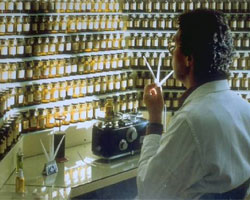Everything You Need To Know About Fragrance
Everything You Need To Know About Fragrance
What makes a perfume last? How do you know when you're wearing too much? Read on for these and other scent secrets.
Excerpts from a fragrance editorial by Lindsy Van Gelder, Everything You Need To Know About Fragrance.

Few products carry the delicious frisson of luxury and glamour that surrounds fragrance. "As perfumers, we create illusion," says Frederic Malle. But along with that mysterious aura, there is also the actual stuff itself - the liquid that sometimes interacts unpredictably with your body, comes on too strong or too faintly, spills, stains, and sloshes around in the physical realm. Responding to the seductive powers of fragrance comes naturally; knowing how to make it work in the practical, everyday world does not. Most of us got our fragrance education at our mother's knees (and the pulse points behind them), and that's a great start. Consider this the master class.
The Top 10 Perfume Questions - Answered
Why does my scent smell different on my best friend than it does on me?
"We all have a unique body chemistry that reacts with the components of fragrance," says Firmenich perfumer Olivier Cresp. Gender, race, coloring, diet, medications, and your skin's dryness or oiliness can all affect it.Is it true that rubbing the wrists together after spraying a scent changes it?
Yes. "When you rub your wrists together, you're warming up your skin and causing some perfume notes to evaporate faster than they should. Hence, you may not get the exact scent intended," Cresp explains.How can I make a perfume last longer?
Well-moisturized skin holds scent better than dry skin, so slather on an unscented body lotion (or one in the same scent) before applying your fragrance. The oils in your hair help retain scent, but don't make a habit of coif-spritzing - alcohol buildup can dry out hair or fade color.How do I know if I'm wearing too much fragrance? How can I tone it down if I do OD?
The famous rule is your fragrance should be detectable only during an embrace. But most of us become acclimated to a scent over time, says Frederic Malle; it's best to figure out how many spritzes are perfect in the first few days you use it. Then stick to that number in the future, even if you can't smell it as strongly. If you happen to overdo it, "rub your skin with a face wipe to remove some of the perfume oil," says Steven Semoff, acting copresident of the Scent Marketing Institute. Or apply a layer of unscented lotion over the fragranced area. "The moisturizing film will reduce the perceived intensity," Semoff explains.Why do some scents give me a raging headache?
Strong odors of all kinds can trigger a severe headache, says Katherine Henry, chief of neurology at Bellevue Hospital in New York City. Many women react only to certain types of fragrance, or even just a particular scent, she says. Switch to a light floral or citrus, or test sample sizes of heavier scents.What does it mean if a perfume's color changes - has it lost its potency?
Direct sunlight, strong overhead lighting, or the simple passage of time can discolor perfume, but that doesn't necessarily mean that the smell has weakened or turned. However, liquid that appears muddy or cloudy does usually mean a sour smell. Orientals and chypres have a longer shelf life than light fragrances do - so consider buying smaller bottles of the latter.Will hot temperatures ruin or alter a scent? Is the best place to store fragrance really in the fridge?
Any temperature over 75 degrees can degrade a fragrance's top notes, making them "sharper, unfamiliar, and even unpleasant," says Cresp. The best place to store perfume is away from light, with cool conditions that don't change. (Temperature shifts make the bathroom a particularly bad spot.) The refrigerator should extend a scent's expiration date by at least 50 percent - maybe more. But keep it away from food that easily absorbs odors, such as butter.Can my fragrance stain my clothes?
The darker the perfume and the lighter the fabric, the more likely it is to stain, says perfume Kilian Hennessy. But the concentration matters: "Most fragrances won't stain clothing if lightly sprayed six to ten inches away," says Semoff. If you accidentally slosh a scent on your favorite sweater, rinse with water and blot with a towel right away.Can perfume harm certain types of jewelry?
Porous materials (pearls, turquoise, opal, onyx, amber, coral, resin) are the most vulnerable to absorbing fragrance, which can affect their ability to reflect light, Cresp says. The damage "is due to the alcohol in perfumes," he says, so don't spray directly on jewelry.What if I spill a bottle all over my rug?
Immediately blot it up with a dry cloth. Then pour some isopropyl alcohol on paper towels and wipe the area to dissolve the aromatic oils, says Semoff; continue blotting and wiping until you've absorbed as much as possible.
How to Return Fragrance
Not all perfume purchases end happily ever after, and there are times when you and Fragrance Wrong need to seek an amicable parting of ways. We checked with a number of department stores and fragrance retailers (including Dillard's, Sephora, and Ulta) and discovered that most of them have surprisingly generous return policies, even when 20 percent or more of the bottle's contents have been used, as long as you still have the receipt. Sephora requires the fragrance's original packaging; most stores also place time limits on returns - between 30 days and six months from the time of purchase. If you and a bottle of perfume you received as a holiday present are already having relationship issues, it's clearly worth taking a minute to check out the store's return policy - you may still have enough time to trade up.
(Van Gelder, Lindsy. "Everything You Need To Know About Fragrance." Allure Feb. 2011: 104-109.)

